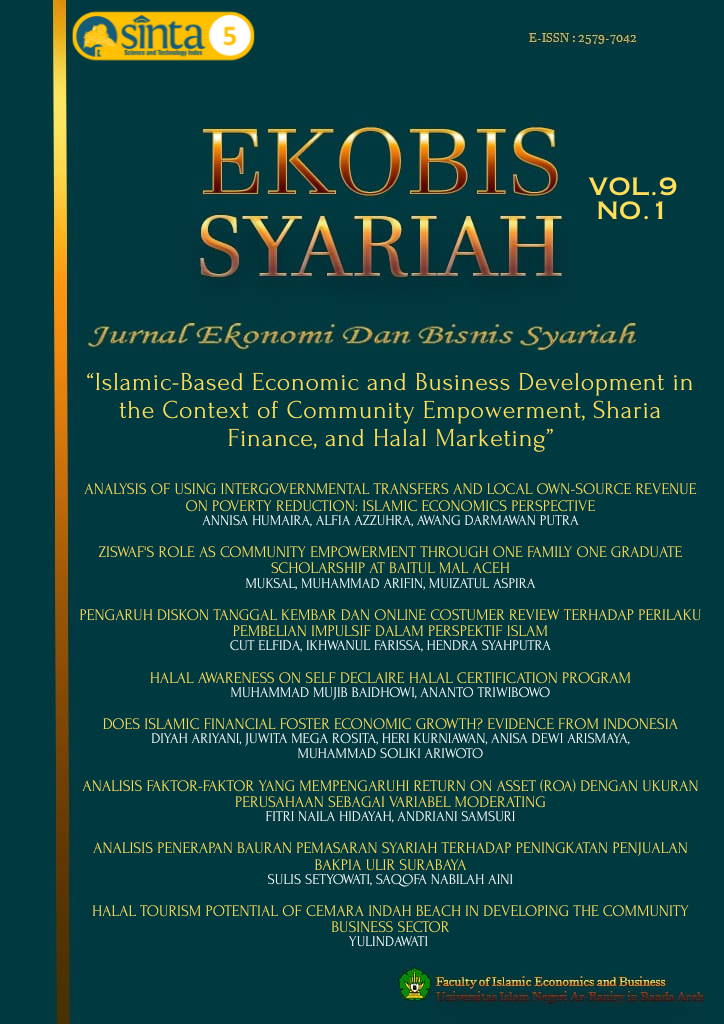HALAL TOURISM POTENTIAL OF CEMARA INDAH BEACH IN DEVELOPING THE COMMUNITY BUSINESS SECTOR
DOI:
https://doi.org/10.22373/34wa2y42Keywords:
Tourism Potential Cemara Indah Beach Community BusinessAbstract
The results of the research show that the tourism potential of Cemara Indah Beach which can support the development of the community's business sector is the location of the tourist attraction close to residential areas so that people can easily open their businesses, Cemara Indah Beach is close to the national road so it has the potential for small businesses from the community, the potential of the sea and a very beautiful beach, the natural beauty around Cemara Indah Beach that supports it, the availability of good facilities and infrastructure, providing tourist facilities for children and adults, the availability of various culinary foods for visitors and the existence of artificial park tourist attractions, sports fields and play areas children. The potential impact of Cemara Indah Beach tourism on the community business sector is the emergence of various types of community businesses such as opening kiosks selling snacks, traditional culinary businesses, the emergence of businesses providing tourist facilities, games rental businesses for visiting children and the existence of a managed culinary business sector. by BUMG Gampong Ujong Batee.
References
Ali, H, Pemasaran Pariwisata. Yogyakarta. Basiya. 2012.
Arjana, I Gusti Bagus, Geografi Pariwisata dan Ekonomi Kreatif. Depok: Rajawali Pers. 2017.
Bambang, Supriadi, Perencanaan dan Pengembangan Destinasi Pariwisata. Malang: Universitas Negeri Malang. 2017. Basiya dan Rozak. Kualitas Daya Tarik Wisata, Kepuasan dan Niat Kunjungan Kembali Wisatawan Mancanegara ke Jawa
Tengah. Dinamika Kepariwisataan VI. XI No. 2. 2012.
Battour, M.,& Ismail, M.N. (2016). Halal tourism: Concepts, pravtices, challenges and future. Tourism Management Persectives. https://doi.org/10.1016/j.tmp.2015.12.008
BPS: Kecamatan Pasie Raja Dalam Angka, 2021.
Bungin, Burhan, Analisa Data Penelitian Kualitatif. Jakarta: Rajawali. Pers. 2012. Chookwaew,S.,chanin,O.,Charatarawat,dkk, 2015. Increasing Halal Tourism Potential at Andaman Gulf in. Journal of
Economic, Business, and Management, III (7).
Fandeli, Chafid, Perencanaan Kepariwisataan Alam, Yogyakarta: Fakultas Kehutanan UGM, 2012.
Gusti, Ngurah Rai, Metodologi. Penelitian Pariwisata dan Perhotelan. Yogyakarta: ANDI. 2016.
Heri, dkk, Strategi Pengembangan Objek Wisata Pantai Pelawan, Tanjung Balai Karimun Sebagai Kawasan Strategis Pariwisata Berkelanjutan. Jurnal Ilmiah Kepariwisataan Volume 15 Nomor 1, tahun 2021.
Ilham dan Sukmawati, Strategi Pengembangan Objek Wisata Pantai Binalatung Kota Tarakan Provinsi Kalimantan Utara. Tugas Akhir thesis, University of Technology Yogyakarta. 2021.
Ismayanti, Pengantar Pariwisata Jakarta: Kompas Gramedia, 2014.
Marpaung, H, Pengetahuan Kepariwisataan, Bandung: Alfa Beta, 2012.
Mason, J, Tourism Impact, Planning and Management. Oxford: Butterworth-Heineman, 2013.
Maya, Eka Raisya, Pengembangan Pariwisata Dalam Meningkatkan Ekonomi Masyarakat Dimasa Pandemi Covid-19 di Gampong Ujung Batee Kecamatan Pasie Raja Kabupaten Aceh Selatan. Skripsi, Meulaboh: Universitas Teungku Umar. 2022.
Middleton, John, Approaches to Communication Planning. Paris: Unesco. 2009.
Nawawi,Dan Martini Metode Penelitian Bidang Sosial. Yogyakarta: Gajah. Mada University Press. 2013
Nurhadi, dkk, Strategi Pengembangan Pariwisata Oleh Pemerintah Daerah Terhadap Pendapatan Asli Daerah (Studi Pada Dinas Pemuda, Olahraga, Kebudayaan Dan Pariwisata Kabupaten Mojokerto) Jurnal Administrasi Publik (Jap), Vol. 2, No. 2, 2013.
Pendit. I Nyoman. Pengantar Ilmu Pariwisata. Jakarta: Pradnya Paramita. 2003.
Peraturan Pemerintah Nomor 50 Tahun 2011 tentang Rencana Induk Pembangunan Kepariwisataan Nasional Tahun 2010
–2025
Peraturan Pemerintah Nomor 24 Tahun 1979 Peraturan Pemerintah RI Nomor 67 Tahun 1996
Pitana,I Gede. Pengantar Ilmu Pariwisata. Yogyakarta: Penerbit Andi. 2019. Prihadi, T. Analisis Laporan Keuangan Teori dan Aplikasi. Jakarta: PPM. 2014.
Setyaningsih. Peran Pemerintah Desa Dalam Pengelolaan Desa Wisata di Desa Jetak Kecamatan Tulakan Kabupaten Pacitan. Eprints.Umpo.Ac.Id, 7. 2021.
Simon, dkk. Penerapan Keselamatan dan Kesehatan Kerja Pada Aktivitas Wisata Berenang Bersama Ikan Hiu (Swim With Shark di Pulau Serangan , Denpasar Selatan. J Destin Wisata. Vol 5 No (2), 2016.
Sofyan, D.K. Pengaruh Lingkungan Kerja Terhadap Kinerja Kerja Pergawai BAPPEDA. Mallikussaleh Industrial Engineering
Journal Vol. 2 No.1. 2013.
Spillane, MJ. Prajogo. Pariwisata Indonesia Sejarah dan Prospeknya, Yogyakarta: Kansius. 2017.
Suansri, Potjana, Community Based Tourism Handbook. Thailand : REST. 2003.
Suardana, Pemberdayaan Perempuan di Kawasan Kuta. Sebagai Upaya Peningkatan Kualitas Pariwisata Bali. Piramida, Vol 1 No 16. 2016.
Sugiyono, Metode Penelitian Pendidikan Pendekatan Kuantitatif, Kualitatif, dan R & D, Bandung: Alfabeta, 2019
Sunaryo,Bambang. Kebijakan Pembangunan Destinasi Pariwisata Konsep dan Aplikasinya di Indonesia. Yogyakarta: Gava Media, 2013.
Surat Keputusan Departemen Pariwisata, Pos dan Telekomunikasi Nomor KM 98/PW:102/M.
Tjiptono,Fandi. Strategi Pemasaran Jasa. Yogyakarta: CV ANDI. 2009.
Undang-Undang Nomor 10 Tahun 2009 tentang Kepariwisata
Undang-Undang Republik Indonesia Nomor 9 Tahun 1990 tentang Kepariwisataan
Wibowo, S. F., Sazali, A., The Influence of Destination Image and Tourist Satisfaction Towards Revisit Intention of Setu Babakan Betawi Cultural Village. Jurnal Riset Manajemen Sains Indonesia. 2016.
Yoeti, Oka. Pengantar Ilmu Pariwisata, Bandung: Angkasa, 2018.
Zaenuri, Drs. M. Perencanaan Strategis Kepariwisataan Daerah Konsep dan Aplikasi. Yogyakarta: e-Gov Publishing Jl.
Mangunegaran Kidul 14 Kraton – Yogyakarta. 2012.
Downloads
Published
Issue
Section
License
Copyright (c) 2025 Yulindawati Yulindawati

This work is licensed under a Creative Commons Attribution-ShareAlike 4.0 International License.
EKOBIS allows the author(s) to hold the copyright and to retain the publishing rights without restrictions. Authors who publish with this journal agree to the following terms:
- Authors retain copyright and grant the journal right of first publication with the work simultaneously licensed under a Creative Commons Attribution License (CC-BY-SA 4.0) that allows others to EKOBIS the work with an acknowledgment of the work's authorship and initial publication in this journal.
- Authors are able to enter into separate, additional contractual arrangements for the non-exclusive distribution of the journal's published version of the work (e.g., post it to an institutional repository or publish it in a book), with an acknowledgment of its initial publication in this journal.
- Authors are permitted and encouraged to post their work online (e.g., in institutional repositories or on their website) prior to and during the submission process, as it can lead to productive exchanges, as well as earlier and greater citation of published work

